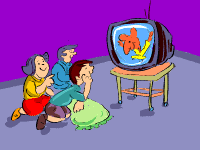When seven-year-old Rohit returns from school, his mother gears up for a battle. The “battle” concerns his television viewing habit. Rohit wants to watch his favourite cartoon show whereas his mother insists that he go out and play in the park for a while.
Such situations are very common and occur in every home. With the emergence of channels specially targeted at children, they tend to be glued to television. And now things have come to such a pass that many parents seem to have thrown up their hands in despair – and “defeat”.
It is a fact that most parents find television to be a convenient tool to engage their child while they do their work without any interruption. For adults, the television may be a way to relax as they are able, or are supposed to be able to judge the difference between fantasy and reality.

The Idiot Box [Illustration by Shiju George]
It has been found that there is tendency among children to imitate the stunts performed by models in the advertisements. Increasingly, research on the subject seems to be pointing out that children who watch programmes replete with violence-based content are more prone to thinking of aggression as a way of life and problem solving, to get what they want.
Apart from the ill effects of limitless television viewing on the minds of young children, the impact on their eyes can definitely be measured. Snuggling too close to the TV, watching in a supine position is bad enough; but the fact that this eats into the time that children are normally supposed to keep for playing outdoors is worse.
A few years ago, a child’s daily routine included an hour’s play at the local park. But nowadays this trend has diminished. Thanks to the television, children prefer staying indoors to the idea of feeling the wind rush past their cheeks in outdoor play. The result: lack of exercise.
Moreover we see a rise in parents allowing their children to have their meals while watching programmes. The dinner table is the only place where the entire family can hope to be together for a while. But with television breaking into that time, inter-personal communication is hampered to a considerable extent.
To a certain extent, parents can try to get something good out of television-viewing habits by encouraging them to watch informative channels.
Parents can inculcate the habit of listening to news every day to increase the sense of awareness regarding current affairs. By working out a timetable for the child that includes selective television programmes and at times that do not interfere with study or sleep time, parents can create a more constructive relationship between television and children.










